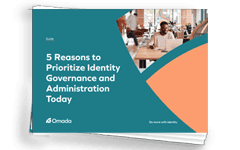Omada, a global leader of Identity Governance and Administration (IGA) software and cloud delivered IGA, recently introduced the latest update to Omada Identity Cloud. The April release builds on Omada’s track record of innovation with improvements to further advance our best-in-breed user experience and flexible configurations. This release aims to help customers optimize business efficiency, improve security, and meet compliance mandates.
Data Object Lifecycle Management
This release includes a major improvement to our provisioning capabilities to enable event-driven data synchronization. This feature enables Omada Identity Cloud customers to use simple configuration tools, building on our strategy of preferring configuration over custom development.
With this feature, it is now possible to configure and provision data updates in target systems, for any Data Object Type, like identities, organizational units, and more. This feature enables common use cases like updating an identity’s email address in the HR system and having it routed back to Omada automatically, managing AD organizational unit’s through Omada Identity Cloud processes, and many more.
In the provisioning section for any system (also identity-based systems) Omada Identity Cloud customers can now configure provisioning for the system including creating task mappings. Like the Resource Lifecycle Management concept, changes are triggered using a code method in an Event Definition or Process. Any standard connector that leverages REST, OData, SOAP, LDAP or SQL can support the Data Object Lifecycle Management.
Additionally, most organizations will manage AD organizational units as part of identity lifecycle management processes, like when people need to create new departments. These OU are where the User accounts are physically placed within the AD org structure. With this release, Omada has added support for the Microsoft Active Directory Connector with out-of-the-box support for provisioning of Organizational Units, eliminating the need for a manual process. Customers can now enjoy improved flexibility, reduced time to implementation, and even more advanced provisioning capabilities to Omada Identity Cloud.
Conditional Handling in RoPE
With this release, the Conditional Inheritance extension in the Omada Role and Policy Engine (RoPE) has been improved to take context assignments into consideration and has been made more configurable, particularly useful for organizations where people work in multiple departments. Enterprises can now extensively configure roles where identities are assigned to a subset of roles. It gives more flexibility in configuration and allows Omada Identity Cloud customers to create assignment policies where the specific permissions assigned are based on identity attribute and context memberships. We have also introduced the possibility to configure inheritance, so it only applies to some roles.
An example: If you have the same organizational setup across several locations, such as hotels, where each location has a “Housekeeping”, and “Concierge” department, you can configure an assignment policy where the location is inherited from the identity or an identity’s context instead of creating an assignment policy for “Housekeeping – Copenhagen” and one for “Housekeeping – New York”. This can greatly reduce the number of assignment policies needed.
About Omada
Omada, a global market leader in Identity Governance and Administration (IGA), offers a full-featured, enterprise-grade, cloud native IGA solution that enables organizations to maximize efficiency, reduce risk, and meet compliance requirements. Founded in 2000, Omada delivers innovative identity management to complex hybrid environments based on our leading technology, proven best practice process framework, and best-in-breed deployment approach.
Learn more about Omada’s Cloud Identity Management solution.






















